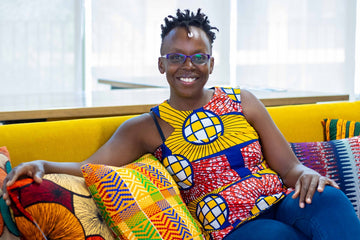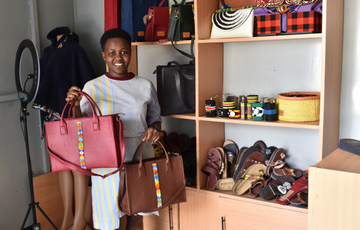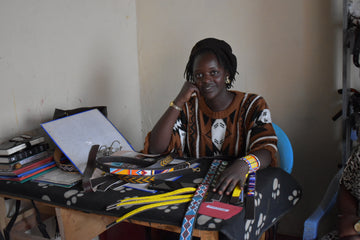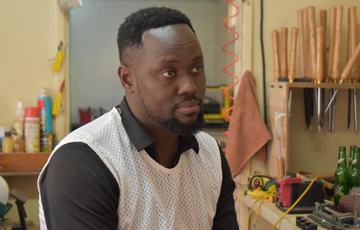“As Africans, we are still playing catch up in learning the art of documented story telling, that need to tell as many diverse stories as possible is what drives me.” - Njeri Wangari

Njeri Wangari is one of Kenya's most prolific poets and a blogging pioneer.
She has a career spanning over 15 years in ICT support, writing and communications and has served in various managerial roles in organizations such as East African Educational Publishers(EAEP), Bloggers Association of Kenya (BAKE), GeoPoll and Cellulant.
Her first collection of poetry published in 2010, Mines and mind fields explores themes of identity, politics and cultural shifts in Kenya.
Njeri recently transitioned into a communications consultancy and has been working with creative entrepreneurs to help them tell and share their story. She is also currently working on a children's poetry book and gave a sneak peek of what's in store




Q 1. What is your Stage/Creator name and what do you do?
KenyanPoet
I am a poet, writer, editor, communications consultant and author of Mine & Mind Fields, My Spoken Words. My passion and work lie at the intersection of new media, arts, culture, & technology in Africa.
Q 2. What’s your background and how long have you been in the field?
With a multi-faceted career spanning over 15 years as a creative, communications, and tech specialist, I am passionate about challenging conventional wisdom about Africa. My work and life's mission is to be one of the continent's most prolific digital storytellers that are shaping the continent’s narratives online. My writing (poetry and articles) has appeared in numerous regional and global publications and her performances have graced stages across 4 continents. I have served in various managerial roles in organizations such as East African Educational Publishers(EAEP), Bloggers Association of Kenya (BAKE), GeoPoll and Cellulant.
Q 3. What does your Art mean to you?
Art is how I express my innermost feelings from the whole spectrum of joy and pain. It is also my way of reflecting how I see the world around me.
Q 4. Why is the type of art you are engaged in so important?
Poetry helps me create meaning to the things that are happening both internally and externally. It is also quite therapeutic. The blank page/paper is the couch where my thoughts find their voice on the tips of my fingers onto a pen or a keyboard as the ultimate form of release
Q 5. What keeps you motivated to create?

Q 6. What successes have you had in your field?
- Becoming one of Kenya’s pioneer contemporary poets and also being the first Kenyan poetry & Arts blogger (in 2004)
- 1st performer at TEDx in Nairobi in 2010
- Having my first international poetry performance in Santiago Chile to an audience of over 1,500
- Becoming one of the co-founders of Bloggers Association of Kenya (BAKE)
- Setting up one of Kenya’s first blog and writing training and outreach program that equipped over 3,000 Kenyans with skills in blogging and running social media
- Publishing my first poetry book in 2010 at 29 years old
- Launching one of the first Kenyan poetry & Arts podcast (KenyanPoet Podcast) in 2011
- Launching a literary community and platform for Poets and Writers ( POWO) in 2011
- Becoming among the first spoken word performers at Kwani open mic and Kwani Literary festival
- Using my poetry as a launchpad into writing and eventually into the corporate world where I worked for 15 years in various communications & marketing capacities
Q 7. What would you say has been the greatest challenge when pursuing your art?
Allowing myself to fall victim to people’s perception that poetry is boring, hard to get and that it does not play an integral part in our lives. This in turn determines what value they are willing to put to it.
Fighting these perceptions, oftentimes feels like a losing battle and sometimes I get into moments of self doubt.
Q 8. What would you like to see change in the literature space in Africa?
- A greater appreciation for our own authors and our own authentic experiences
- A proliferation of literary works for all ages especially children
- The value that African governments place on books, literature and authors. It is abominable that governments such as the Kenyan one levy taxes on books!
Q 9. Any exciting projects coming up?
Oh yes! I recently ventured into writing children’s poetry. I have so far written 5 manuscripts under 3 projects; the first project is a book of African rhymes. I have already submitted two manuscripts to a publisher for consideration. I have also written a three part book series celebrating the life of Prof. Wangari Maathai. The third project is also an illustrated alphabet of rhymes.
The other project I am working on is the relaunch of my KenyanPoet show - a podcast that engages some of the most prolific and outspoken African creatives, thinkers, makers, and builders for candid conversations about how they are weaving their own thread in Africa's new identity. It also explores the intersection between technology, new media, creative expression, culture & heritage in Africa.
Q 10. Two fun facts about you?- I don’t know how to ride a bike. I didn’t learn when growing up. Am too scared to learn for fear of hurting my knees... LOL
2.I love the outdoors, am an avid runner and hiker
Where can one read your work?
Website: https://kenyanpoet.com/
Blog: https://kenyanpoet.com/blog/
Bonus
Q 11. What is your writing process like?My writing process has gone through various transitions over the years. There was a time I only wrote when I found my muse. Back then, finding the mojo was easy. With time, this became untenable. I’d go for days without writing waiting for the inspiration to hit me until I realized that I have to always be writing.
Nowadays I write every morning 5 days a week whether I feel inspired or not. I keep lots of drafts, most of which contain a working title and an outline. Everyday, I go back to the drafts. They could be drafts for an article, a poem, a blog piece etc. When you have set aside 3hrs everyday for writing, you have no choice but to write. I also give myself a target of either 5 poems per week or 1 article per week which helps in keeping me focused.
Q 12. What advice do you have for writers?
- Write even when you don’t feel like it.
- Always have a pen & notepad or Evernote on your phone and write drafts, snippets or ideas as they come up either for a story or a poem or whatever form of writing you are into
- Put yourself out there. Open and run a blog, find online publications (magazines, etc.) that accept contributions and submit your work even if they are not paying. Build your online profile every day. Use your social media presence to promote your work.
Q 13. If you could tell your younger writing self anything, what would it be?
Do not worry too much about what people think or say of you. Write about the things that you relate with the most, your audience will find you.
Q 14. What was an early experience where you learned that language had power?
It was while in high school when I read Ngaahika Ndeeda (I will marry when I want) by Ngugi wa Thiong’o and Ngugi wa Miiri. I soon learnt that they had both been arrested, detained and later went into exile for writing the play. That is when I realized the power of words and language. This experience has continued to greatly inspire my work. I write my poems in English and Gikuyu, my mother tongue. There are some truths I can only express in my mother tongue.





